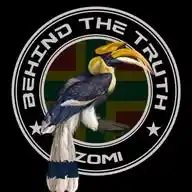
𝔹𝔼ℍ𝕀ℕ𝔻 𝕋ℍ𝔼 𝕋ℝ𝕌𝕋ℍ (𝔹𝕋𝕋)
January 20, 2025 at 09:20 AM
*Day 1 —*
*Introduction: Being Zomi*
_"Who are we?"_ This timeless question transcends individual introspection; it is a collective inquiry into existence, purpose, and identity. For the Zomi, it is not merely a question—it is a call to rediscover and reaffirm their shared history, culture, and values. It invites us to delve into the layers of their communal memory, deeply rooted in oral traditions, cultural resilience, and a profound sense of belonging. The Zomi identity, far from being static, is a dynamic interplay of adaptation and survival.
The name _Zomi_ is more than a linguistic construct; _it is a historical narrative_. As Dr. Vumson (1986) elucidates in _Zo History_, *"The term Zo is the most widely used name, whether it be Zo, Yo, Jo, Sho, or Khxou. It is the name of origin, and its significance transcends any imposed identity"*. While linguistically, Zo is often interpreted as "highland" or "hill people," its meaning goes far beyond geography—it embodies the essence of a people who have endured the trials of history and emerged united.
This enduring identity reflects what anthropologists describe as cultural elasticity: the ability to preserve core values while adapting to external pressures. For the Zomi, this adaptability is evident in their response to centuries of political marginalization and colonial reclassification. The _Chin and Kuki_ labels imposed by colonial authorities were not mere administrative tools; they sought to fracture a cohesive identity. Yet the Zomi resisted. As Khamkhansuan (2023) notes, *"Colonial nomenclature often sought to compartmentalize the Zomi into disconnected entities, but their oral traditions and shared values held them together."*
The Zomi ethos of _Tlawmngaihna/Tawmngaihna_ is central to this resilience—selflessness and mutual aid. This moral principle has guided their social interactions and served as a unifying force through generations. As noted in _The Indigenous Zomi_, *"Tlawmngaihna is not simply a practice; it is a philosophy, shaping the Zomi worldview and reinforcing the bonds of kinship and community"*. This philosophy emphasizes Zomi's ability to thrive amidst adversity, transforming challenges into opportunities for collective growth.
The Zomi journey is a testament to the paradox of permanence and change. Identity is a negotiation between the stories we inherit and those we create. Similarly, the Zomi narrative balances the weight of ancestral legacies with the demands of modernity. Zomi history is not a relic but a living guide, offering lessons on resilience, adaptability, and the power of self-definition.
*To be Zomi is not just a statement of fact but an act of reclamation—a refusal to let external forces dictate who they are*. _To be Zomi, then, is to remain rooted in the wisdom of the past while stepping boldly into the future._ It is to carry the lessons of history not as a burden but as a source of strength and guidance.
*Thought to Reflect On:*
When others impose names upon you that deviate from your own, preserving your true name becomes an assertion of identity and heritage. A name is not merely a word; it is the vessel of a people's history, culture, and worldview. To safeguard your name/identity is to uphold the integrity of your lineage and the collective memory it represents, ensuring that your narrative remains authentically your own.
*Question for Reflection:*
What does it mean to you to carry the legacy of being Zomi? How do you define what it means to be Zomi?
*Next Step:*
Tomorrow, we will delve into the origins of the name Zo and uncover the historical threads that continue to bind the Zomi people together.
BTT
🔴🟡🟢
https://whatsapp.com/channel/0029VaYCqe71yT229xZ6f42y
👍
❤️
😂
💯
🐒
🐖
👎
💩
🦟
🎯
89